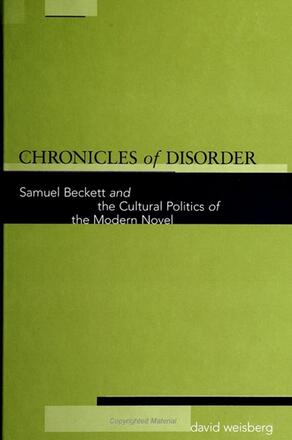
Chronicles of Disorder
Samuel Beckett and the Cultural Politics of the Modern Novel
Alternative formats available from:
Offers a striking new interpretation of Beckett's major fiction, demonstrating how his development as a writer was shaped by shifting twentieth-century ideas about the social function of literature.
Description
Offering a striking new interpretation of Beckett's major fiction, Chronicles of Disorder demonstrates how Beckett's career as a writer developed in relation to the most enduring twentieth-century beliefs about the social function of literature, language, and narrative. Weisberg explores Beckett's emergence as a major novelist and intertwines sharp analyses of the relations between narrative form and social content in the key works of the Beckett canon. He considers how and why Beckett's work has become ahistorically—and incorrectly—subsumed into poststructuralist-inspired claims about language and narrative ideology, and he uses Beckett as a case study for tracing out the genesis of the opposition of "autonomous" and "committed" art, and how this opposition influenced the canonization of modernism in the 1950s and 1960s.
David Weisberg is Assistant Professor of English at Wesleyan University.
Reviews
"This is a smart, original contribution to Beckett studies and to the study of literary modernism and postmodernism. It calls attention to the ways in which acceptance of a dominant critical paradigm has caused us to misread the cultural politics of a major author's work. It gathers energy toward its final, startling juxtaposition of Beckett and Orwell, which so powerfully epitomizes the argument sustained throughout the book about Beckett's ability to 'overcome his interwar ambivalence to a modernist ideal of "aesthetic autonomy" by constructing a narrative form that consciously exploits the contradictions of such an ideal. '" — Ann L. Ardis, author of New Women, New Novels: Feminism and Early Modernism
"Weisberg's contribution lies not only in his clear exposition of how Beckett's work is embedded within the polemics of his own day but in his mapping of a new trajectory from an early Beckett whose work suffers from 'contradictory and ambivalent allegiances,' to a later Beckett who finds his metier in expressing those very contradictions. " — Joseph Natoli, author of Mots D'Ordre: Disorder in Literary Worlds